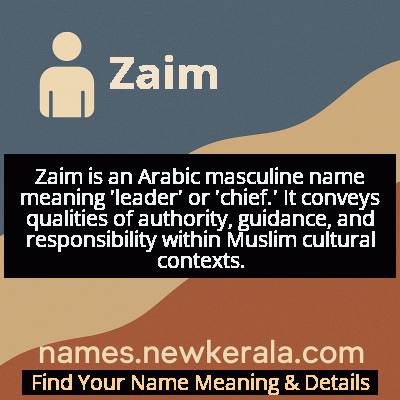Zaim Name Meaning & Details
Origin, Popularity, Numerology Analysis & Name Meaning of Zaim
Discover the origin, meaning, and cultural significance of the name ZAIM. Delve into its historical roots and explore the lasting impact it has had on communities and traditions.
Name
Zaim
Gender
Male
Origin
Muslim
Lucky Number
4
Meaning of the Name - Zaim
Zaim is an Arabic masculine name meaning 'leader' or 'chief.' It conveys qualities of authority, guidance, and responsibility within Muslim cultural contexts.
Zaim - Complete Numerology Analysis
Your Numerology Number
Based on Pythagorean Numerology System
Ruling Planet
Uranus (Rahu)
Positive Nature
Strong sense of order, loyal, practical, and disciplined.
Negative Traits
Stubborn, overly serious, rigid, and prone to feeling restricted.
Lucky Colours
Blue, gray.
Lucky Days
Saturday.
Lucky Stones
Blue sapphire.
Harmony Numbers
1, 7, 8.
Best Suited Professions
Managers, engineers, accountants, organizers.
What People Like About You
Dependability, discipline, practicality.
Famous People Named Zaim
Zaim Topčić
Writer and politician
Prominent Bosnian literary figure and political leader
Zaim Imamović
Military commander
Ottoman military leader and administrator
Zaim Nezirović
Academic scholar
Renowned professor in Islamic studies and Oriental philology
Name Variations & International Equivalents
Click on blue names to explore their detailed meanings. Gray names with will be available soon.
Cultural & Historical Significance
The cultural resonance of Zaim extends beyond its literal meaning of 'leader' or 'chief.' It represents a cultural archetype of the responsible protector and guide—someone who leads by example and maintains the welfare of those under their care. This has made the name particularly valued in communities that emphasize strong family and community structures. The name's continued usage, though not extremely common, demonstrates how traditional leadership values remain relevant in modern Muslim societies, serving as a bridge between historical cultural practices and contemporary identity formation.
Extended Personality Analysis
Individuals bearing the name Zaim are typically characterized by strong leadership qualities and natural authority. They often display confidence, decisiveness, and a sense of responsibility that makes others naturally look to them for guidance. These individuals tend to be protective of their loved ones and communities, showing loyalty and commitment in their relationships. Their leadership style is usually practical and grounded, combining strategic thinking with genuine concern for others' wellbeing. They're often seen as pillars of strength in challenging situations, demonstrating resilience and the ability to maintain composure under pressure.
Beyond their commanding presence, those named Zaim typically possess a strong moral compass and sense of justice. They value honesty and integrity, and their decisions are often guided by principles rather than mere convenience. While they can be assertive when necessary, they generally balance this with empathy and consideration for others' perspectives. Their natural authority is typically tempered with wisdom, making them effective mediators and problem-solvers. The name suggests someone who takes their responsibilities seriously but does so with a sense of purpose rather than ego, embodying the ideal of servant leadership where authority serves the greater good.
Modern Usage & Popularity
In contemporary usage, Zaim maintains a respected position within Muslim naming traditions, though it remains relatively uncommon compared to more popular Arabic names. Its usage is most prominent in Bosnia, Turkey, and various Arab countries where its historical and cultural significance is best understood. The name appeals to parents seeking traditional names with strong meanings that reflect leadership qualities and cultural heritage. While not trending dramatically in popularity charts, it enjoys steady usage among families who value its distinctive sound and meaningful connotations. In recent years, there's been a mild resurgence of interest in such historically significant names as Muslim communities globally seek to maintain cultural identity while navigating modern multicultural environments. The name's relative rarity adds to its appeal for parents looking for unique yet culturally authentic names for their sons.
Symbolic & Spiritual Meanings
Symbolically, Zaim represents the archetype of the guide and protector—someone who provides direction and security in both literal and metaphorical senses. The name embodies the concept of being a foundational pillar for one's family or community, suggesting stability, reliability, and the strength to withstand challenges. Metaphorically, it represents the bridge between tradition and progress, carrying the wisdom of the past while navigating contemporary complexities. The symbolism extends to concepts of moral courage and the willingness to assume responsibility when others might hesitate. In a deeper sense, Zaim symbolizes the human capacity for leadership as a form of service—where authority is exercised not for personal gain but for the benefit and protection of others, reflecting the ideal balance between strength and compassion in guiding others through life's journey.

